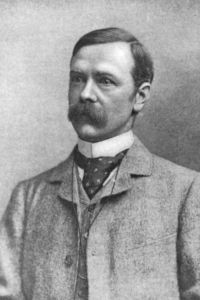
When Love Calls
And there was Mr. Herapath fishing from the ledge. It made me giddy to look at him. The rock overhung the water so much that he could not stand upright; the first person who got there must indeed have learned to curl himself up from much sleeping in Norwegian beds, which were short for me. I thought of this oddly enough as I watched him and laughed, and was for going on. But when I had walked a few yards, meaning to pass around the rear of the cliff, I began to fancy all sorts of foolish things would happen. I felt sure that I should have no more peace or pleasure if I left him there. I hesitated. Yes, I would. I would go down and ask him to leave the place, and he would do it.
I lost no time but ran down the slope smartly and carelessly. My way lay over loose shale mingled with large stones, and it was steep. It is beautiful how quickly an accident happens; how swiftly a thing that cannot be undone is done, and we are left wishing–oh, so vainly–that we could put the world, and all things in it, back by a few seconds. I was checking myself near the bottom when a giant stone I stepped on moved under me. The shale began to slip in a mass and the stone to roll. It was all done in a moment. I stayed myself; that was easy enough, but the stone took two bounds, jumped sideways, struck the piece of board which was only resting lightly at either end and before I could take it all in, the little bridge plunged end first into the current, which swept it out of sight in an instant.
He threw his hands in affright, for we both saw it happen, for he had turned. He made indeed as if he would try to save it, but that was impossible, and then, while I crouched in dismay, he waved his arm to me in the direction of home–again and again. The roar of the falls drowned what he said, but I guessed his meaning. I could not help him myself, but I could fetch help. It was three miles to Breistolen, rough, rocky ones, and I doubted whether he could keep his cramped position with that noise deafening him and the endless whirling stream before his eyes while I was going and coming. But there was no better way I could think of; even as I wavered, he signalled to me again imperatively. For an instant, everything seemed to go around with me, but it was not the time yet, and I tried to collect myself and harden my heart. Up the bank, I went steadily and, once at the top, set off at a run homewards.
Read or download Book
Stanley J. Weyman
Stanley John Weyman (7 August 1855 – 10 April 1928) was an English historical romance writer. His most famous works, written between 1890 and 1895, were set in late 16th and early 17th-century France. While very successful at the time, they are now largely forgotten.
Biography
Stanley John Weyman was born on 7 August 1855 in Ludlow, Shropshire, the second son of a solicitor. He attended Shrewsbury School and Christ Church, Oxford, leaving in 1877 with a degree in Modern History. After a year’s teaching at the King’s School, Chester returned to Ludlow in December 1879 to live with his widowed mother.
Weyman was called to the bar in 1881 but had little success as a barrister, as he was shy, nervous and soft-spoken. However, his shortage of briefs gave him time to write. His short story “King Pippin and Sweet Clive” appeared in the Cornhill Magazine, although its editor, James Payn, himself a novelist, told Weyman it would be easier to make a living writing novels. Weyman viewed himself as a historian and was encouraged by positive notices for an article he wrote on Oliver Cromwell, published in the English Historical Review.
Weyman’s ill-health prompted him in 1885 to spend several months in the South of France with his younger brother Arthur. In December of that year, the brothers were arrested on suspicion of espionage at Aramits. A 24-page critical biography of Weyman published as an annexe to an edition of his novel Ovington’s Bank (1922) suggests that this ordeal galvanised the thirty-year-old Weyman, who until then had scraped a meagre income writing short stories. His first novel, The House of the Wolf, was published in 1890. Like many of his successful works, it is set in the French religious wars of the late 16th and early 17th centuries.
Weyman became a full-time writer in 1891. Four years later, he married Charlotte Panting at Great Fransham, Norfolk, and moved with her to Ruthin, Wales, where they lived for the rest of their lives. Weyman died on 10 April 1928, his wife surviving him by four years; they had no children.
Reputation
In his day, Weyman was publicly popular and admired by writers such as Robert Louis Stevenson and Oscar Wilde. In a 1970 BBC interview, Graham Greene said, “The key books in my life included Anthony Hope, Rider Haggard, Captain Gilson, and I occasionally re-read them. Stanley Weyman in particular.” Works like The Three Musketeers by Alexandre Dumas had established a market for popular historical fiction, and it was a crowded field. Contemporary rivals included Baroness Orczy, A. E. W. Mason, John Buchan and Rafael Sabatini.
The biographer Reginald Pound grouped Weyman with Arnold Bennett, Anthony Hope, Aldous Huxley, Dorothy L. Sayers and Somerset Maugham as Strand writers. He is now perhaps the least familiar of all these. His most tremendous success came before 1895 (Under the Red Robe, A Gentleman of France and The Red Cockade), and he stopped writing entirely between 1908 and 1919. His style and focus are more typical of Victorian writers, as are his faults. With odd exceptions such as Gil de Berault in Under the Red Robe, his characters are pretty uniform, his women’s caricatures, and his dialogue wooden to modern ears.
Weyman’s strength lies in historical detail, often in less familiar areas. The Long Night is based on the Duke of Savoy’s attempt to storm Geneva in December 1602, an event still celebrated annually in a L’Escalade festival. Weyman received an award from the city for his research. The financial security of early success allowed him to choose subjects of personal interest. Some had less general appeal, such as the 1832 Reform Bill (treated in Chippinge), post-1815 industrialisation (Scarecrow Farm) or the 1825 financial crisis (Ovington’s Bank, reprinted in 2012 and 2015 on the back of a similar situation in 2008).
Weyman called his books “pleasant fables” and was aware of their modest literary value.






